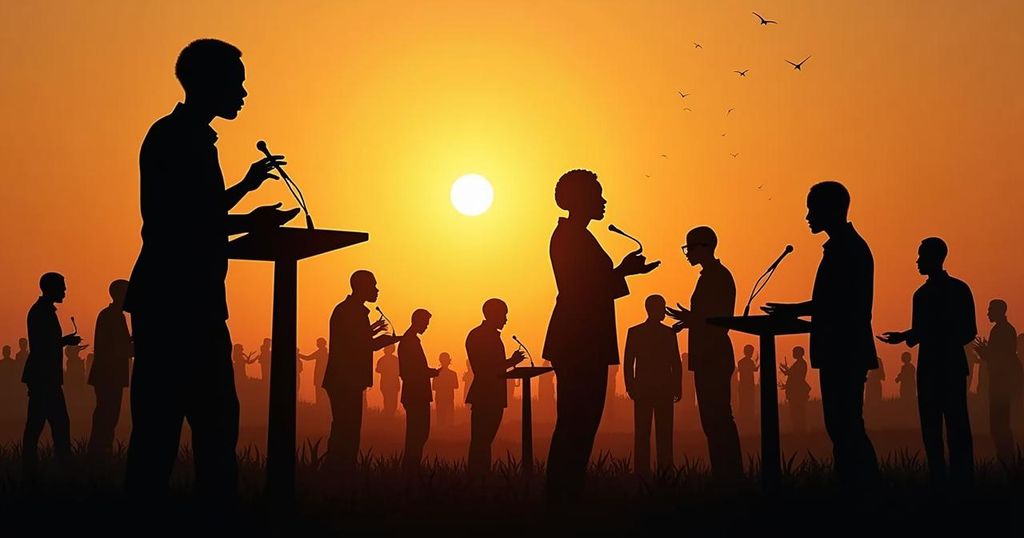Mozambique’s Pivotal Election: Chapo Faces Strong Contenders in Shift from Independence-Era Leadership
Mozambique’s upcoming presidential election marks a significant shift in leadership with the emergence of candidate Daniel Chapo, born post-independence, representing Frelimo amid growing public discontent. Competing against him are notable figures like Venâncio Mondlane and Ossufo Momade, striving to capture an electorate eager for change. Allegations of voter fraud and ongoing challenges related to poverty and security loom over the election process, creating a dynamic environment as the nation seeks to redefine its political future.
Mozambique is poised for a pivotal election that marks a significant transition in leadership, as the long-held sway of leaders who emerged from the independence struggle against Portuguese colonial rule comes to an end. For the first time, the Frelimo party, traditionally dominant in Mozambique’s political landscape, has nominated a presidential candidate born post-independence: the 47-year-old Daniel Chapo. His candidacy aims to galvanize a disillusioned electorate after nearly five decades of Frelimo rule. Political analysts observe a notable shift in voter sentiment, with reports indicating that Frelimo campaign teams have faced public discontent, with instances of boos and rejection at rallies. Chapo, whose ascent began in local governance since 2011, represents a new generation within Frelimo that promises to distance itself from the institutional corruption that has shadowed the party since 1975. However, the challenges he faces are significant, especially given the tarnished legacy of Frelimo’s current administration, which grappled with the fallout from a corruption scandal linked to the notorious “tuna bond.” Critics, including renowned human rights activist Mirna Chitsungo, express skepticism about Chapo’s ability to enact meaningful change within a system deeply entrenched in corruption. Chapo’s credibility is bolstered by his relative newness to the political stage; he has gained popularity for his promise of integrity and renewal in governance. Yet, allegations of voter fraud, notably the presence of “ghost voters”—an estimated 900,000 fictitious names on voter rolls—cast a shadow over the electoral process. Nevertheless, Chapo is not the only contender. His main rivals include Venâncio Mondlane, an independent candidate who has garnered support, particularly from younger voters with a compelling message of national pride and visible rally turnout. Additionally, Ossufo Momade of the Renamo party and Lutero Simango from the Democratic Movement of Mozambique (MDM) are also vying for the presidency. Mondlane seeks to appeal to the electorate by promoting job creation and economic opportunity, especially vital in a nation where over half the population lives in extreme poverty. As Chapo and Mondlane rally support, the context of violence in Cabo Delgado due to an ongoing insurgency continues to simmer beneath the surface but has not significantly shaped the electoral discourse. As both candidates campaign vigorously in Mozambique and among the diaspora in South Africa, the political landscape remains fluid, with many stakeholders cautious in predicting the election outcome.
The upcoming elections in Mozambique are particularly significant as they herald the end of an era dominated by leaders associated with the country’s independence struggle from Portuguese colonial rule. This marks the first presidential election where a candidate, Daniel Chapo, has been born after Mozambique’s independence in 1975. The transition to younger leadership comes at a time when the Frelimo party faces rising discontent among voters who are dissatisfied with its lengthy and often controversial governance record. Economic challenges, exacerbated by corruption scandals, have added pressure on political candidates to present viable solutions to create jobs and reduce poverty amidst ongoing insecurity in some regions.
The impending elections in Mozambique represent a crucial crossroads for the nation as it bids farewell to a generation of leaders rooted in the independence struggle. Daniel Chapo’s candidacy encapsulates hopes for rejuvenation within the Frelimo party, whilst challengers like Venâncio Mondlane illustrate the electorate’s appetite for change. As the election approaches, the potential for a transformed political landscape hangs in the balance, influenced heavily by public sentiment regarding corruption, economic opportunity, and national stability. The outcome remains uncertain, underscoring the vibrancy and complexity of Mozambique’s democratic processes.
Original Source: www.bbc.com




Post Comment